#in english... i just happen to like a lot of nuances that emerge from japanese characters' speech bc they're so exaggerated
Explore tagged Tumblr posts
Text
i've been thinking about nahyuta's title as the "last rites prosecutor" because i think it's an interesting part of his character that's immediately apparent from his first appearance... in japanese it's written as トムライの検事 (tomurai no kenji) with tomurai meaning funeral/burial. this is pretty self-explanatory considering his tendency to pray for the victim but i actually think it's really interesting that the localization opted for the term "last rites" instead
last rites are a specifically christian practice of praying for the dying to absolve them of their sins before they die - in other words, prayers given to the deceased wouldn't be considered last rites (x)
this is a pretty blatant contradiction of the original's meaning and what nahyuta actually does in the game but i think it's interesting to consider that the person he might be praying for is the defendant (and under khura'in's DC act, the defense as well), not the victim... even outside of khura'in we see that those who are proven guilty in murder trials are executed, and we know that nahyuta has been acting as a prosecutor under ga'ran, almost definitely sending several rebels and defense attorneys to their deaths in the process.
it would just be really tragic if his habit of praying came out of desperation at being forced to send innocents or even former comrades/friends to their deaths... whether it being interpreted as a funeral rite for the victim arose from the people around him or as another act of desperation from nahyuta to cover his actual intentions doesn't matter as much since i think one would have led to the other anyway...
#satsusays#nahyuta sahdmadhi#spirit of justice#ace attorney#i haven't checked out aa too much in other languages but i do see things here and there from people i follow and#it's interesting... it's always nice to have versions to compare imo because you can consider them both canon#admittedly i am more often a critic of localization than not but sometimes really cool things happen and i would never want that taken away#and anyway about half of the time it's less a grievance about the localization and more a lament about smth being impossible to portray#in english... i just happen to like a lot of nuances that emerge from japanese characters' speech bc they're so exaggerated#and communicate so much with just simple word choice... that's a part of characters you just can't get in other languages#maybe i'll talk more about other stuff in the future but i am just translation nerd. and also unfortunately a stupid weeb
52 notes
·
View notes
Note
Helloo! I really liked your last post on Endeavor being Ra and all of your posts about myths. It reminded me of something someone told me once. They said that myths are intriguing since they teach us lessons. The gods act no different than us. They make mistakes and these things are told through stories. One of the things they told me was how underworld myths usually mean to accept the past. Your post makes think that it represents Endeavor accepting the past and then being born again.
Hello hello, I am really happy to know that you really liked the Endeavor and Ra post, including my other ones! Thank you for sending in your comments, they’re very interesting. Before anything else, I’d like to apologize for responding so late. I took some extra time to think about how I wanted to reply to your comments. This post ended up becoming super long as well (mostly because of the images).
As you state, I love reading through myths and stories because the majority of them contain lessons for us. You are right when you state that the gods act no different than us, and because of that they make mistakes. Although the numbers who worship and take part in some of these polytheistic religions have greatly diminished over the course of history, in the present time we like to explore these stories and continue to be influenced by them. It is because of their human mistakes that sometimes we even relate to these gods and goddesses. These stories capture our imagination and I’m sure plenty of us have once had daydreams of being a demigod or another mythical figure/creature.
I do think that the High End vs Endeavor fight was a pivotal moment where Endeavor confronts himself, begins to face the past, and is thus “born again.” The depiction of Hawks and Endeavor’s quirks combined together, of flaming wings had a phoenix like imagery to it.
Although Endeavor is “born again” it of course does not mean that he is free from all the horrible things he did to his family. It does not mean a new, fresh start. I think that him being “born again” here represents symbolically that he has made an internal change of mind, accepting a different perspective (although to what extent is up for debate). Phoenixes do not d/ie and resurrect once. Similar to how the sun rises and sets everyday, the phoenix lives a cyclical life of d/eath and rebirth.
I did not know that underworld myths can be tied with accepting the past. If that is true than it definitely does relate back to some of the things I was talking about in my Ra post. So yes, the High End vs Endeavor fight was a very important moment for Endeavor. In a sense, he is “born again” but not with the fresh start it suggests. If he has begun to accept the past what does this mean and how might the next step look like?
As readers, we all bring very different past experiences and beliefs to the table, and that’s the thing about life. We all think differently. The majority of people have valid reasons as to why they think they do, however I am very much against all the attacking, insulting and discourse that have emerged over Endeavor’s character.
Personally, on the topic of redemption: I believe that Endeavor will most likely not be redeemed. This is something that he too also believes. However at the same time while we may have opinions, the question of redemption is not for us to really answer. We are mere observers.
I’ve wanted to do a close read of a certain group of chapters during the Internship Arc for a while. Of course if you don’t agree with what I have to say here or are not interested, than that’s fine. This “analysis” is not written in defense of Endeavor but to take a closer look at how Horikoshi’s been developing and writing him. If anything, please take any excitement you may detect in my writing as my love for “analyzing” and sharing my thoughts.
Chapters 249 through 252 are important chapters after the High End vs Endeavor fight that delve further in to his thoughts and his family’s thoughts as well. You can do a close reading of many of the pages in these chapters but I will only focus on some of Endeavor’s own inner thoughts.
Unfortunately, since I can not read the raw Japanese text, I’m building everything on top of the “official” English translations so please keep that in mind. If the nuances in the translations are off or lost in translation, then my interpretations may be “wrong.” (Btw, I’m only like 95% sure that the panels I’m using below are all from the official English translation).
Let’s begin. The two panels below are from Chapter 249 titled “The Hellish Todoroki Family.”
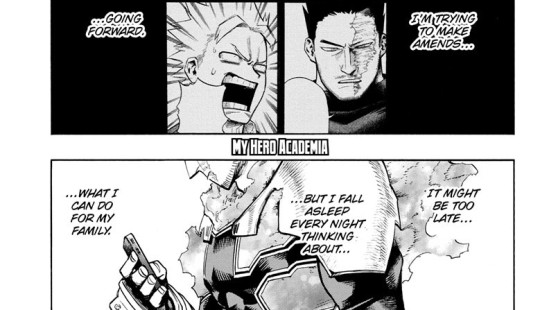
“I’m trying to make amends... going forward.” The “going forward’ definitely suggests that there was some sort of turning point either during the High End fight or shortly after. The definition of amends in the dictionary is:
reparation for compensation for a loss, damage, or injury of any kind
“It might be too late... but I fall asleep every night thinking about... what I can do for my family.” Endeavor expresses that he falls asleep every night thinking about what he can do for his family. We can only take him for his word but keep in mind that these are his inner thoughts. He isn’t talking to anyone but to himself. I acknowledges that it may be too late for him to do anything, all the damage he’s caused. Despite realizing that there’s a good chance that there’s nothing he can do to amend anything, he still thinks about it.

“Lately, it’s been the same dream. The wife and kids, looking happy... at the dinner table. But I’m... never there with them.” Here he states that he’s been dreaming the same dream. This means that it’s been heavy on his mind. In his dream, his family is happy and he is not there with them. Perhaps he believes that their happiness can only become a reality if he is taken out of the picture.
Now let’s jump to Chapter 252, titled “The Unforgiven.” These panels occur after Natsuo is kidnapped by Ending, and he is rescued by the teamwork of Bakugo, Midoriya and Shouto after Endeavor hesitates and fails to do so.
Endeavor had his flames on while they’re after Ending but he gets rid of them right before or when he catches Natsuo and Bakugo. So Endeavor usually has his flames on and that’s how we saw him depicted until around the High End fight and onwards, where we see him more without his flames.

(This has nothing to do with the analysis but this has to be one of my favorite interactions between Endeavor and Bakugo. He does not hesitate to make comments and remarks... hahaha, gets me every time.)

“Natsuo. Believe it or not... I was never trying to neglect any of you.” Well first of all, Endeavor saying that he was never trying to neglect any of his children is a big slap in the face and to be honest I’m appalled that he states that. Ultimately, it may be absolutely one hundred percent true that he means what he states, however whatever his thoughts may have been, Endeavor neglected them. Period.
Let’s look at Endeavor’s body language. His eyes are cast towards the ground as he can not meet Natsuo’s eyes when he gives his “confession” and it looks like his upper body is bowing towards Natsuo.
Just in general based on what I’ve read and from my own experiences, bowing is practiced for the purposes of respect, courtesy or apology. Typically it is the younger person who bows to the older person or someone from a “lower” position bowing to someone from a “higher” position. Part of Natsuo’s expression of surprise in the left most panel probably has to do with both the words that are coming out of his father’s mouth and the fact that Endeavor is bowing his head down towards him.
“But... all I could do was blame others and dodge responsibility. WIth Toya too... I might as well have killed him myself!” Here he admits that for a while he’d place the blame on others and dodge responsibility, including with what happaned to Touya. He admits that he may as well have killed Touya himself. Personally when I first was reading this, it was actually very interesting to see Endeavor confess these things. Isn’t it kind of surprising to see that he’s admitting to all this instead of continuing to be a character who ignores and refuses to recognize faults and consequences of his actions? Or is it just me.

Natsuo responds with “Didn’t neglect us...? So what...? Toya has always told me everything. It’ll be a cold day in hell... before I forgive you. Cuz I’m not as caring as Shouto.” Natsuo states that “it’ll be a cold day in hell” before he forgives Endeavor. A “cold day in hell” is an idiom meaning: the time of occurrence of an event that will never happen. It looks like he’s kind of smiling probably at how absurd his father’s confession sounds and his eyes are tearing up, a reaction to his sudden confession. He brings up Touya and the estranged state that their family had been living since for possibly as long as he could remember.

“Even so... Even so... you keep showing up for Fuyumi right? And for your mom’s sake?” Here Endeavor’s addressing Natsuo’s statement claiming that he’s “not as caring as Shouto.” Forgiveness is one of those things we are told that we need to do at some point and if we don’t, that it says something about our character. The one who forgives is the one who has had wrong done to and it takes a lot for someone to give forgiveness after all that has been done. So here, Natsuo says that he can not forgive Endeavor because he is not as caring as Shouto but I feel like there’s also a part of Natsuo that feels like he could be a bad person if he can not forgive.
Endeavor’s response is to tell him that despite what Natsuo thinks of himself, the fact that Natsuo continues to show up and try to do things that he doesn’t want to do because he cares about Fuyumi and his mother speaks otherwise. Notice the faded background in this panel as well. Btw, here we can see that Endeavor is indeed kneeling in front of Natsuo. They both are sitting on the ground, together, close to eye level but not quite.

“Your sister loves the idea of being a big happy family... because... that’s exactly what I ruined. She wants that back... she’s so eager to fix everything. And that’s why YOU’RE trying at all. Because you care about how she feels right...?” Each of the Todorokis have different feelings and perspectives about Endeavor. For example, Fuyumi wants to be a “big happy family” which Endeavor acknowledges and claims responsibility for ruining. Even though Natsuo may not want what Fuyumi hopes for, he still comes to visit home despite if Endeavor is there because he cares about his sister.

“Because you ARE caring. So...” Endeavor states that Natsuo is a caring person. He’s been watching what Natsuo will do for Fuyumi and his mother because of how much he cares about them. Another thing that stands out to me in the English translation is that Endeavor says, “Because you are caring” not just “You are caring.”
Shout out to the guy in the car (o_o)
“You’re getting yourself to be able to forgive him. Because you’re so caring.” In response to Endeavor’s counter that, no Natsuo IS caring, Natsuo responds to this by thinking back to Midoriya’s earlier conversation with Shouto when they were cleaning up the dishes after dinner. Midoriya is someone who does not know about the Todoroki family situation as much as we may but he knows Shouto: his classmate and friend. However, we see that Natsuo overheard those words and I think it made him feel like he wasn’t a good person because he feels like he does not want to or can forgive.
We get a closer angle and view of Natsuo and Endeavor sitting on the ground. Again, the fact that Endeavor is kneeling may be why the guy in the car has the expression they have. So I kind of went looking around to see what the way Endeavor is sitting is called and I think the closest would be the seiza pose.
Seiza, is the formal way of sitting down based on ancient Japanese standards. In Japanese, Seiza is very aptly translates to “sitting with a correct posture.” In a historical context, the correct posture is defined to have neatly-folded legs and an erect spine. One’s feet must be neatly tucked in place, underneath the body.
The Japanese consider Seiza with only the highest of regards, as it represents two important values in Japanese culture: courtesy and apology. They believe that Seiza is an essential tool to channel those specific values.
Another important representation that Seiza upholds in Japanese culture is that it serves as a symbol of apology. Someone who wishes to ask for an apology may place his or her hands in front, with the head lowered down. This form of apology is referred to as “dogeza.” This serves as a position of submission, having one accept his or her mistakes (yabai).
The picture below is depicting someone in the seiza pose, apologizing.

This ties in to how Endeavor and the Todorokis live more “traditionally” compared to other characters. We’ve seen the traditional Todoroki house and Shouto’s dorm room at UA as well. Earlier, we saw Endeavor with his head bowed towards Natsuo and here he is no longer bowing but he is still in the seiza pose: a symbol of courtesy and apology. It’s a physical sign of sincerity and humility.

This is how Endeavor is apologizing, even if it is not as direct as some of us would like it to be. And Endeavor tells Natsuo:
“You don’t have to forgive me.” Endeavor tells Natsuo that he has no obligation to forgive him, even when he is his father. What a way to say it though. “Because you ARE caring. So, you don’t have to forgive me.” It was kind of confusing for me when I first read this chapter. Currently, the only way I can read this is that (1) Endeavor realizes to a certain extent of the hurt and pain that he caused his family and (2) it is because of what Natsuo experienced as a Todoroki and what happened to his brothers, sister and mother that he can not bring himself to forgive his father. He hurts for his family because he cares about them. “You don’t have to forgive me.”
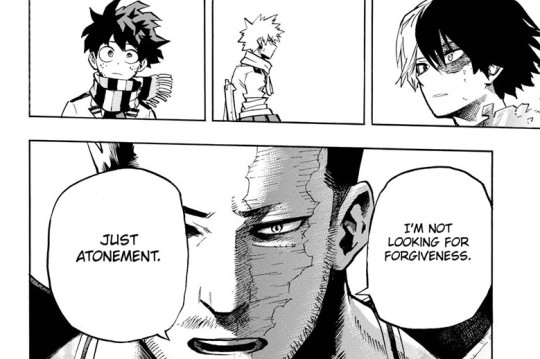
We get three panels with Shouto, Bakugo and Midoriya listening in on to this conversation. Notice the white, empty backgrounds in all four panels. Usually this is done to highlight a moment that has gravity and weight. This is them processing what has just been said. The bustling city highway and life fades away and we are left with this moment where time feels like its paused.
Then Endeavor speaks again: “I’m not looking for forgiveness. Just atonement.” We see Endeavor’s left eye, the side of the face that has been scarred after the High End fight. His right eye, the part of his face that has remained unchanged is hidden behind the speech bubble with the words, “Just atonement.”
Seeing as how Horikoshi likes to intentionally place speech bubbles to hint at something from time to time, I’m wondering what this particular placement might mean. I will touch on this later again, but Endeavor has a habit of hiding and standing off to the side when it comes to his family and past. Additionally, this is the first time we’re looking at Endeavor’s face from the front and not from the side during this conversation with Natsuo (excluding the panel from the first page from this chapter when he’s holding Natuso and Bakugo before the conversation begins).
What is atonement? According to the first definition that comes up on Google:
reparation for a wrong or injury
In general religious contexts, it is:
reparation or expiation for sin
In Christian theology, it is:
the reconciliation of God and humankind through Jesus Christ
So in religious contexts: to receive forgiveness there must be a sacrifice which “atones” for the sin (tastethehoney).
Basically, what I’m trying to point out with the latter two definitions is that this word is often used in religious contexts. I’m assuming that Endeavor is the one referred to as the “The Unforgiven” in the title of this chapter and I think that it’s very interesting that Endeavor’s fire quirk is called “hellflame,” which I’m pretty sure that I can safely say is in reference to the Judeo-Christian/Western concept of hell.
(Forgive my choice of using a simplified statement here but for the purposes of getting a point across...) They say that those who are not forgiven burn in hell.
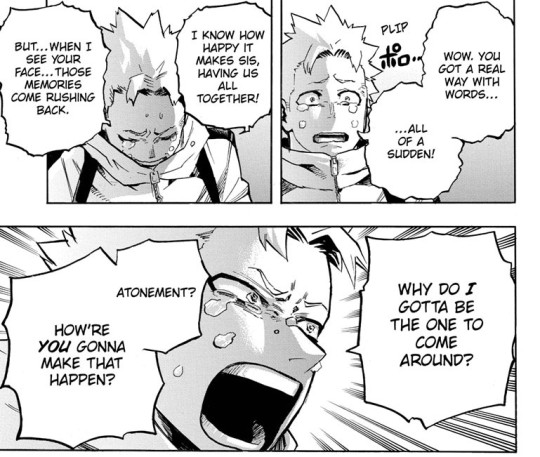
“Wow. You got a real way with words... all of a sudden! I know how happy it makes sis, having us all together! But... when I see your face... Those memories come rushing back.” Natsuo’s reply comes from Endeavor’s sudden display of apologizing. And as Natsuo correctly points out, they’re still just words. Words do not mean anything unless actions come with them. He mentions how hard it is for him because the “memories come rushing back.” Even though the life they live now is different from the past, the past keeps coming back.
“Why do I gotta be the one to come around? Atonement? How’re YOU gonna make that happen?” Again, when someone apologizes or is looking for forgiveness, the person who was wronged or hurt has to come to a certain place to forgive. As we’ve already established, Endeavor is not looking to be forgiven. So this could be Natsuo’s reply to Endeavor’s claims that he wants to change and be better, because it still kind of requires the other party to “come around” as well. Here Natsuo also asks about atonement. Endeavor can not turn back time and do things differently, what’s done has been done. So, how can Endeavor atone, and what will it look like?
Let’s skip a couple pages to when Endeavor and Natsuo arrive home.

“I’ve let you shoulder all of that. . . and I stood by while you worked hard. But it’s okay now.” This is referring to how Fuyumi has been planning on welcoming her mother back home. Endeavor states that he’s been standing off to the side, perhaps there is a note of apology as he talks about how Fuyumi’s been working hard by herself. Then he states, that “it’s all okay now.”
“It’s always the same dream. My whole family’s there, but not me.” So, Endeavor’s thinking back to his dreams of his family’s happiness. He believes that they can only be happy if he’s not there.
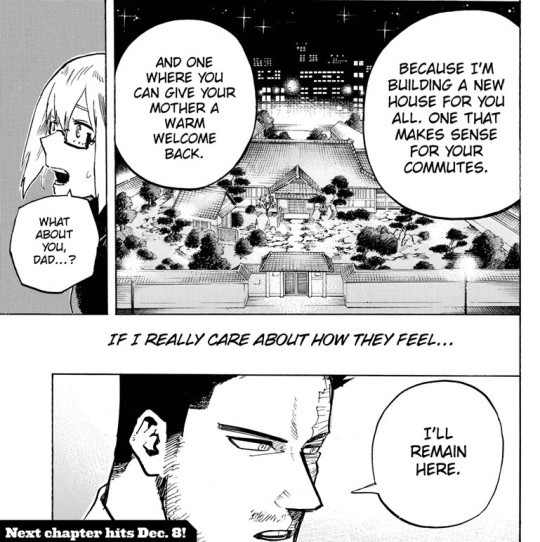
“Because I’m building a new house for you all. One that makes sense for your commutes. And one where you can give your mother a warm welcome back.” He states that he’s building them a new house. One where they can welcome their mother back. This is Endeavor’s idea of what “atonement” might begin to look like
“If I really care how they feel...” He wants to respect their feelings, and not do something because HE wants to.
“I’ll remain here.” It seems that Endeavor believes that one way he can “atone” for his family is to remove himself physically from their lives.
Through this post, am I claiming that Endeavor will be redeemed? No. However, let’s look at what redemption means. According to the first two definitions that comes up on Google, it is:
the action of saving or being saved from sin, error or evil
or
the action of regaining or gaining possession of something in exchange for payment or clearing a debt.
There really is not a way Endeavor can “pay the debt” for all the hurt and pain he’s caused.
So that was a lot but I’m going to point out some things here. Yes, Endeavor is in a position where he is acknowledging the past, and he seems to have begun taking more responsibility for it. He states that he is not looking for forgiveness and is only looking for atonement. However, similar to how he neglected his family because he was running away from the blame and did not want to accept the responsibility due to his actions, he is still in a way running away from it. His idea of “atoning” includes removing himself physically from his family’s lives, partially because he wants to be considerate of his family’s feelings and partially because he believes that they can only be happy if he’s not there. He could be right, but I disagree.
As many others have stated before, it seems that part of the answer to atonement lies with Todoroki Touya. As I suggest in the Ra post, there were two outcomes of the High End vs Endeavor fight: 1) Endeavor, the public hero establishing himself as the Number One Hero and 2) Todoroki Enji as a father beginning to accept the past and its responsibilities (again, although to what extent is debatable).
The fight concludes with Endeavor’s first official meeting with his son, Touya as Dabi. To accept and address the past and its responsibilities, Endeavor’s been taking a passive approach to “atone” partly because he’s kind of treating the past as only the past.
In Chapter 290, titled “Dabi’s Dance,” where we get the Touya reveal, Dabi finally is able to call Endeavor out: "You were finally number one! It’s all you ever wanted! But it must’ve weighted on you, right?! Or was all the praise and admiration like chicken soup for your soul?! When at long last, you could stare your kids in the eye... didja finally start to feel the warm and fuzzy bonds of family?! You must’ve thought, ‘As long as I face the future, I can be better!’ I can tell you’re at a loss for words, so here’s the answer!”
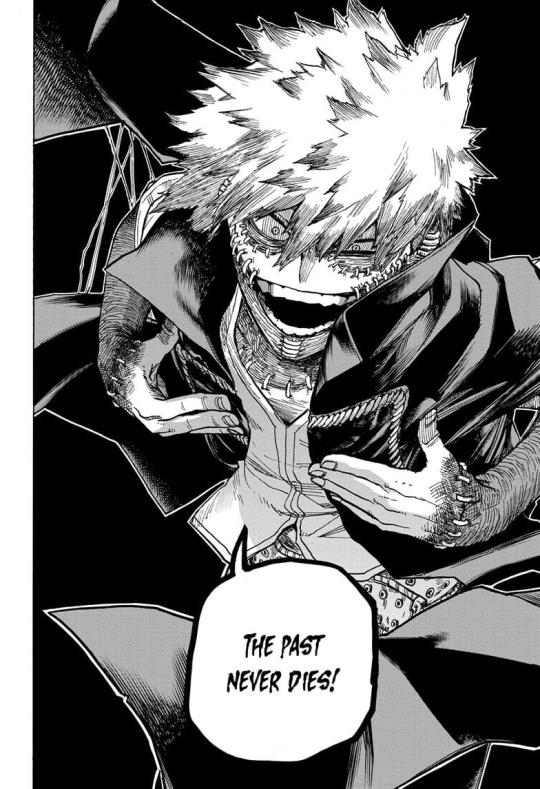
Being Touya, Dabi’s existence brings the past right back to the present. Endeavor can not keep responding in a passive way, dodging the past even if it weighs heavy on his mind and heart.
I suppose this is where the real test of atonement begins.
#endeavor#todoroki enji#todoroki touya#dabi#todoroki natsuo#bnha analysis#mha analysis#bnha meta#mha meta#luna answers#my post
28 notes
·
View notes